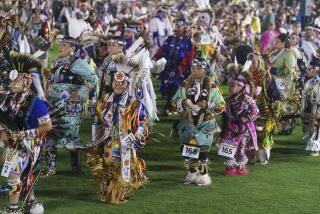Tribes Say Ban Doesn’t Target Gaming Devices
RIVERSIDE — Operators of casinos on Indian lands across California on Tuesday defended their video gambling machines--popularly viewed as slot machines--and rejected pronouncements that they are prohibited by a new state Supreme Court ruling.
Despite statements by Gov. Pete Wilson and Atty. Gen. Dan Lungren that the court has effectively banned the most popular form of gambling at the state’s Indian casinos, tribal leaders and their attorneys offered a different interpretation Tuesday.
“This case does not eliminate Indian gaming on reservations,” said Berkeley attorney John Shordike, who represents several gaming tribes.
At worst, tribal attorneys say, the 38 Indian casinos in California may have to reconfigure their video gambling machines so that payoffs are directly linked to gamblers’ wagers to fit the lottery definition.
The Supreme Court ruled Monday that the California Lottery’s keno game is illegal because its payoffs are not distributed from among the players’ pool of wagers--the definition of a lottery--but because the state, operating as the bank, keeps all losing wagers and pays off winning bets on a predetermined schedule.
California Lottery spokeswoman Gina Stassi said Tuesday that possible replacement games for keno--which this fiscal year was expected to generate nearly $400 million--are being researched and tested. She said she did not know when a new game would be unveiled.
Under federal law, Indians can only operate forms of gambling that are permitted by state law. But in contentious, years-long litigation that probably will end up at the U.S. Supreme Court, California’s tribes have argued that their 12,100 video slot machines are not unlike the state’s lottery offerings and that Gov. Pete Wilson should concede their use.
The California court’s ruling “means the use of any electronic gaming devices or slot machines are not allowed,” Lungren said.
Attorneys for the state’s gaming tribes--many of which have have experienced windfall profits from reservation casinos--strongly disagreed.
In putting their most positive spin on Monday’s ruling, they said nothing in it handcuffed the use of video and computer technology, which would allow gambling devices with many slot machine traits.
Howard Dickstein, a Sacramento attorney who represents several tribes that operate casinos, noted that part of Monday’s ruling found that use of a computer or video terminal was not keno’s illegal feature.
“The court specifically agreed with the tribes that the distinguishing feature of a lottery has nothing to do with the devices on which it is played, but in the way you pay the prizes,” he said.
Shordike said: “To the extent that the federal court limits games on Indian reservations to games that can be squeezed into the definition of a lottery, then, of course, the tribes will have to adjust their games so they meet those requirements. And that can be done.”
The tribes were active players in the keno litigation, filing briefs that defended the legality of the state’s keno game and further arguing that the state lottery was legally empowered to offer slot machines--meaning, by extension, that they could as well.
Indian gaming tribes say their machines are not technically slot machines because they do not feature pull-arms and do not dispense cash, but instead give paper receipts that are redeemed for money by a cashier.
The question of whether the Indians are using California-banned slot machines is among the issues pending before a federal judge in Sacramento. That decision has been held in abeyance so both sides could argue how Monday’s California Supreme Court ruling might affect their pleadings.
No matter the definition of a slot machine, state officials say they are skeptical that the machines can be redefined as lottery devices.
“It would be difficult at best to technically reconfigure an electronic slot machine such that it can be operated as a lottery,” said Lungren spokesman Steve Telliano. “If that were the case, I imagine the California Lottery already would have found a way to do that.”
But San Rafael attorney George Forman, who advises Indians on gaming law, said the machines “absolutely” can be reconfigured to meet the lottery definition, by determining payoffs based on the players’ pool of wagers and retaining a “commission” for the casino, as is now done for poker and other card games.
“There are any number of systems out there now that operate in a way that would pass the Supreme Court’s smell test for the lottery,” Forman said.
The court’s decision “leaves open how the state and tribes will resolve the ongoing debate over electronic gaming,” said Daniel Tucker, chairman of the California Nevada Indian Gaming Assn.
Lungren “is so blinded in his efforts to deny Indians an opportunity to renounce welfare that he is trumpeting as a victory a decision that means a multimillion-dollar loss to state educational funds,” Tucker said.
Clifford LaChappa, chairman of the Barona tribe near San Diego, which offers more than 1,000 video slot machines at one of the state’s largest casinos, said:
“We will continue to do what we are doing. If we lose our machines, it would be devastating to the tribe. The machines are our main source of income and without them, we’d be back to square one in our economic development.”
Times staff writer Paul Lieberman contributed to this story.
More to Read
Sign up for Essential California
The most important California stories and recommendations in your inbox every morning.
You may occasionally receive promotional content from the Los Angeles Times.










